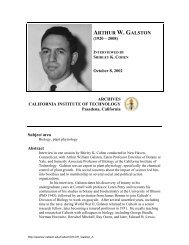Interview with Thomas A. Tombrello - Caltech Oral Histories
Interview with Thomas A. Tombrello - Caltech Oral Histories
Interview with Thomas A. Tombrello - Caltech Oral Histories
Create successful ePaper yourself
Turn your PDF publications into a flip-book with our unique Google optimized e-Paper software.
<strong>Tombrello</strong>–14<br />
population. I wasn’t a totally stupid kid. I might have been an unreconstructed Southerner,<br />
because all my friends were and you didn’t dare appear to be a damn Yankee. First time a new<br />
kid comes in they asked you in those days, “Are you a Yankee? You don’t talk like a<br />
Southerner.” I can talk like a Southerner. So I took on all the local coloration and truly believed<br />
most of it, except I knew one thing. I realized that, in fact, by keeping the African American<br />
population down, you were keeping the economy down. If economic times got better for them,<br />
my father might actually make more money, because they’d have more money to spend in his<br />
store. So I sort of figured that out—that the South was not as vigorous an economy as it was<br />
going to be a few years later, because they had this huge group in the population that really had<br />
rotten jobs and were kept in rotten jobs by the unions, by everybody.<br />
Now, during that period one would have thought that it would change, because there was<br />
a migration of people from the East. This is a bunch of Yankees moving to Fort Worth, but the<br />
amazing thing was, they became Southerners very quickly. I think they took on all the attributes<br />
of the local population almost immediately. You didn’t see any sign that the people coming in<br />
from the East—the “damn Yankees”—had views about segregation different from anybody<br />
else’s. It was not until 1954, when I just finished high school, that Brown v. Board of Education<br />
came through, and of course we were aghast that this was going to happen. So, you know, it<br />
would have been nice to say that I was liberal in a social sense, but I wasn’t, really.<br />
My parents were conservative. I do remember that in the 1944 election my parents, as<br />
nearly as I could tell, were the only people in Memphis who voted for <strong>Thomas</strong> Dewey.<br />
Everybody else voted for FDR. My father and mother had voted for him in 1932 and never<br />
voted for him again. We were Republicans in a foreign land. Of course, we were registered<br />
Democrats. There really wasn’t a Republican Party in the South, except in the black community.<br />
FDR got a lot of their votes, but the structure was that the local Republican Party was largely<br />
African American. As for people from other countries, the United States was white and black.<br />
So, from junior high to high school, I was a chubby little kid for a few years. Smart,<br />
wore thick glasses. Funny-looking little kid. And it hasn’t totally worn off. But I quit being<br />
chubby sometime at the end of junior high. Got interested in sports but wasn’t very good at it.<br />
Got good grades but didn’t really care about the academic parts of school. I was trying to pass<br />
for being like everybody else. I was interested in sports and model airplanes and later cars and<br />
girls, and it was a question of trying to pass. I did not really associate <strong>with</strong> the other bright kids.<br />
http://resolver.caltech.edu/<strong>Caltech</strong>OH:OH_<strong>Tombrello</strong>_T

















